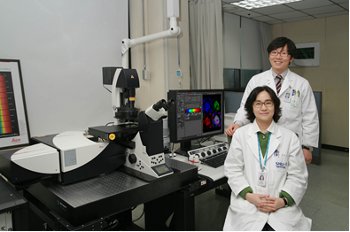From February 2013, the Seoul National University Hospital Biomedical Research Institute (SNUH) in Korea offers super-sensitive and super-resolution imaging with the advanced high-end imaging system Leica TCS SP8 STED to its more than 400 researchers.
For the wide range of applications from simple cell biology to reperfusion live experiments, the institute’s confocal microscopy core facility requires a high-performing system featuring the best possible sensitivity and super-resolution. The decision for the Leica TCS SP8 STED was made after a thorough comparison of various confocal systems in terms of technical design and imaging results.
 Ms Yong Soon Han and Mr Tae Bok Lee, medical technologists at the SNUH, in front of the newly acquired Leica TCS SP8 STED.
Ms Yong Soon Han and Mr Tae Bok Lee, medical technologists at the SNUH, in front of the newly acquired Leica TCS SP8 STED.
Leica’s high-sensitive spectral detection, which uses a prism for spreading light into a spectrum and offers a continuously variable choice of emission bands via mirror sliders, impressed the researchers with the best collection of weak fluorescence signals. The medical technologists, Ms Yong Soon Han and Mr Tae Bok Lee, state: “Leica images are very clear and feel like real”. Along with the superior sensitivity, the unique and highly precise control panel for convenient handling of the system was a decisive factor in favor of the Leica TCS SP8 STED.
The Leica TCS SP8 STED super-resolution system is the first Leica product ever acquired by the SNUH laboratory, which started confocal microscopy operation in 2005. However, many researchers at the institute have had the chance to work with Leica confocal microscopy before in countries such as the US and highly appreciate the purchase decision of SNUH.
The Leica TCS SP8 acquired by the Korean institute was the 100th to leave the factory of Leica Microsystems. The pleasant outstanding global success of the new confocal platform greatly exceeds the company’s highest expectations.